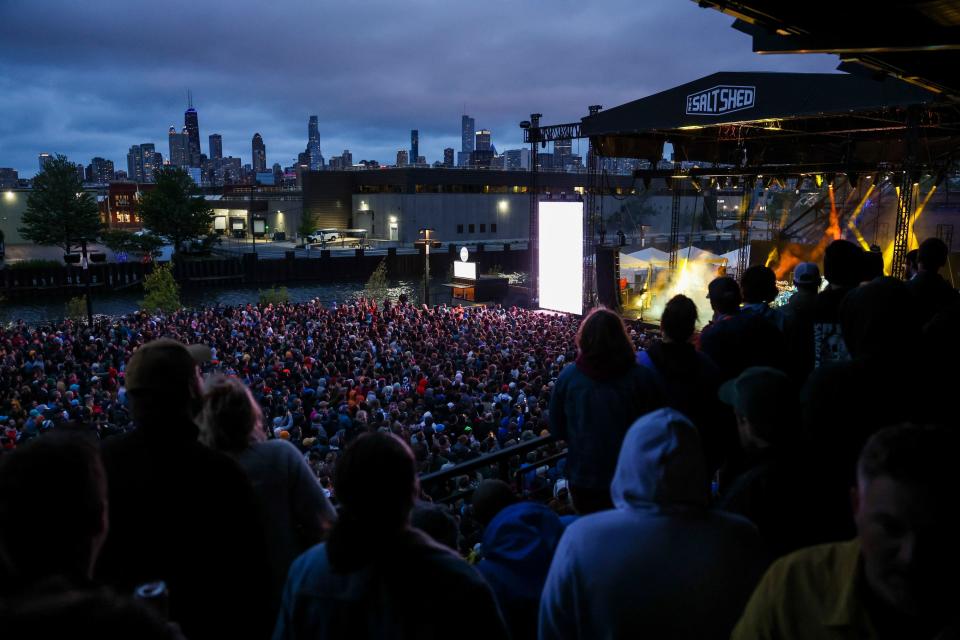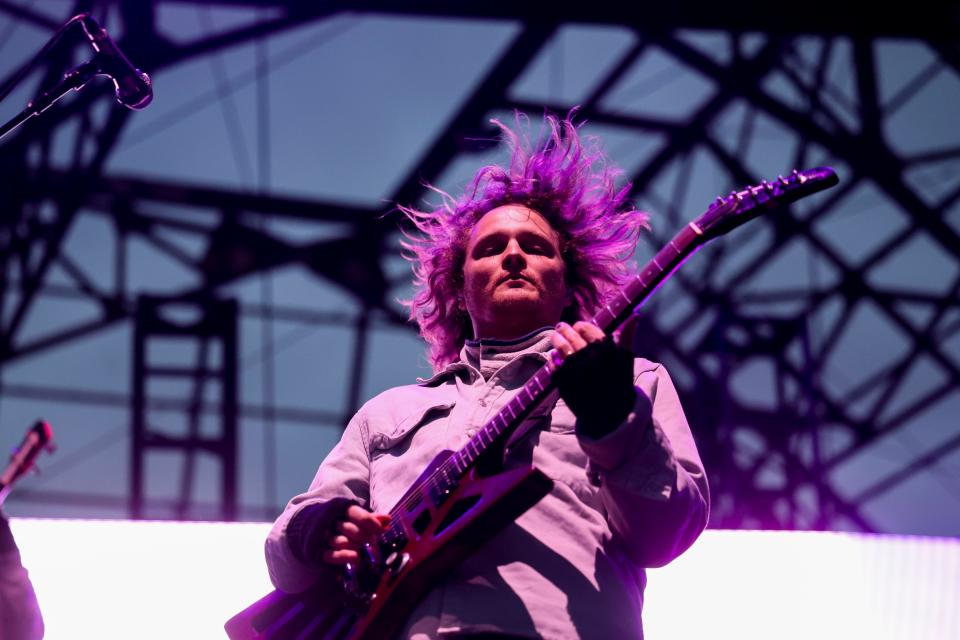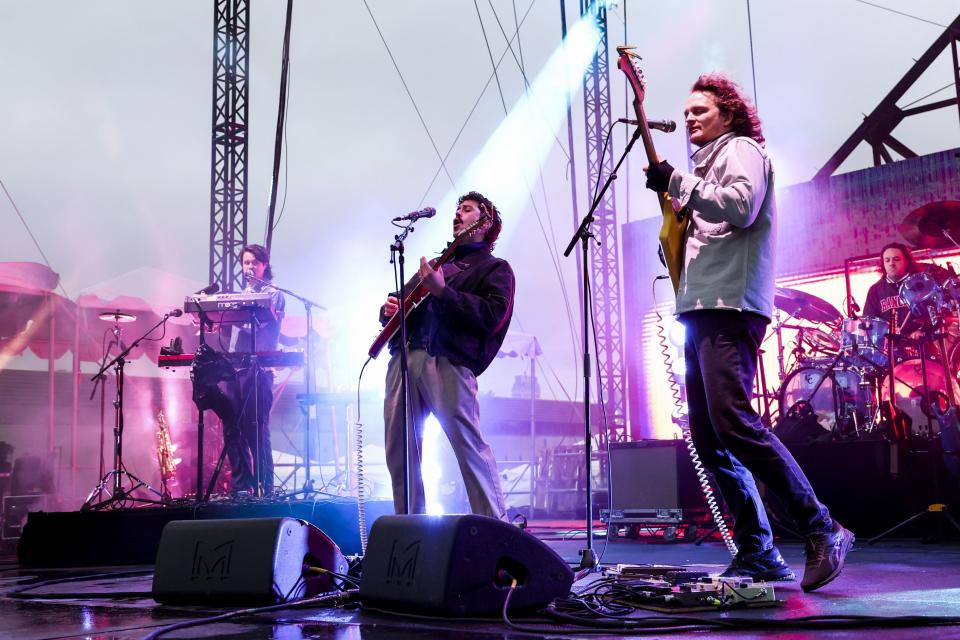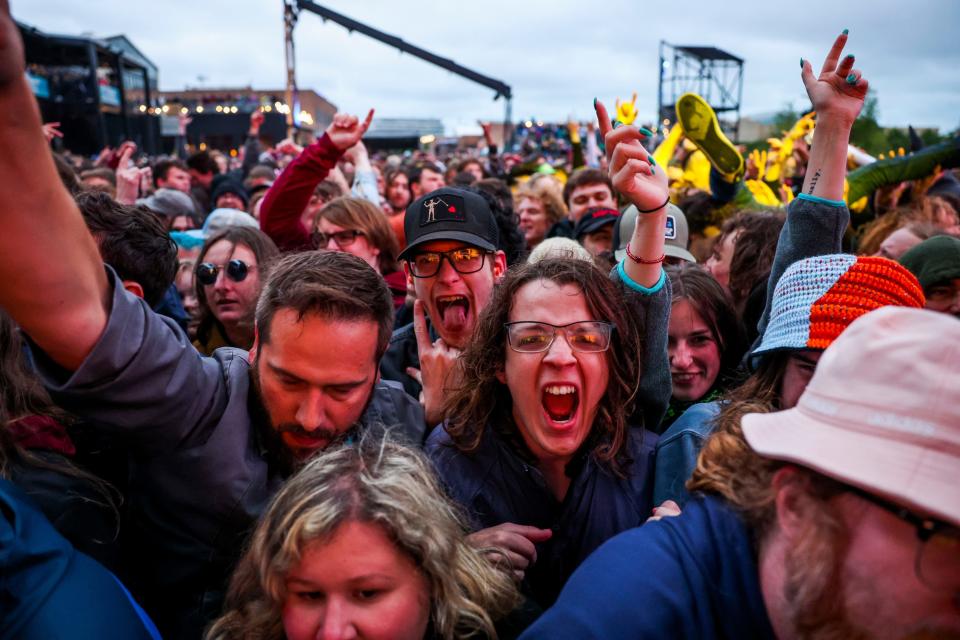Review: King Gizzard & the Lizard Wizard isn’t a band, it’s a lifestyle. And a strange one at that.
- Oops!Something went wrong.Please try again later.
King Gizzard & the Lizard Wizard — which is cool to say, if nothing else — is fun. Like, capital F fun. The same fun once associated with rock. The kind of heady, indulgent fun that leaves me wondering if they’re idiots or geniuses. They are hard to pin down, and that’s the point of KGLW. They’re from Australia. They’ve made 24 albums in 13 years. They look like a bar band full of tech dads. Your friend who pines for the glory days of Rush is super into them. Your friend likes his bands virtuosic, but he’s also a loose canon. If that other fun Aussie import, AC/DC, traded in its caveman clubs for the complete Rush, Steely Dan and Metallica discography, they might approach the alchemy of KGLW. Or maybe KGLW is more like the live equivalent of vibing with friends on a bedroom floor with a stack of vinyl: Listen to this. No, listen to this. You’ve got to hear this part.
I don’t know what I think about King Gizzard & The Lizard Wizard, to be honest. They are embarrassing one minute, and sound like the future the next — as any act this prolific might be.
They are also the best time you can have at a concert right now, and that includes Taylor Swift.
Not that this is a competition, or that there’s much overlap of constituents, but they do share DNA. Taylor sold out three nights at Soldier Field. KGLW sold out three at the Salt Shed on the Chicago River. Tickets for both went in a blink. On Sunday night, at the first KGLW show, I met people who drove in from Minneapolis, Cleveland, Pittsburgh, St. Louis; I met a couple who flew in from KGLW’s three sold-out shows at Red Rocks in Colorado. They talked about KGLW as if they were friends with the band and the band was friends with the fans. Swifties would understand.
KGLW is becoming a lifestyle.
They would be the new Grateful Dead if Taylor Swift weren’t already the new Grateful Dead, an American traveling obsession, to be dissected each night and shared among a vast network.
But KGLW, still mostly a word-of-mouth cult, is coming up fast. You could argue they are not even a band but a way of being. At Salt Shed, on a windy, drizzly, cold June night, they played 14 songs from 12 albums; it was obvious some of their biggest fans didn’t even recognize everything. Which, again, is the point. Show to show, they rarely repeat songs. Maybe you get a favorite, maybe not. They are so committed to this, they played only two songs from their new album (and that’s coming this week). They want shows to seem unique, instead of based on static set lists and familiar expectations. Some of their shows feature music written only for that show. They encourage bootlegging of their performances and merchandise. They ask fans to sample from their recordings and construct entirely new songs. Last year alone, they released five albums. As Pitchfork put it: “Being a King Gizzard fan is pretty much a full-time job.”
Still, as jobs go, Sunday was a breeze.
They opened with the angular, indie rock of “Pleura.” They lent a glorious Blue Öyster Cult-like stomp to “The Great Chain of Being.” They recalled the prog crunch of Jethro Tull on “Satan Speeds Up,” with flute. “Trapdoor” — which centered on KGLW founder Stu Mackenzie, the Gizzard King, growling “Trapdoor! Trapdoor!” — was weird enough to fit into a Frank Zappa suite. It’s hard to listen to them, or even discuss them, without hearing precedents. Yet lovingly so. Spinal Tap wouldn’t have had the guts to name an album what KGLW named its latest: “PetroDragonic Apocalypse; or, Dawn of Eternal Night: An Annihilation of Planet Earth and the Beginning of Merciless Damnation.” If you’re seeing witches, dragons, devil’s horns — good job.
KGLW, as rangy as they can get, explode with confidence (and warmth) when they go thrash metal. The centerpiece of Sunday’s show was a rampaging rave-up (dedicated cheekily to John Mayer, a nod to the Dead and Co.’s Wrigley shows last weekend), stretched across multiple songs, played without break, changing whiplash tempos, from race to chug, then back again. They play doom metal with a fan’s love of tropes and wink at the silly stuff. In fact, their metal moonlighting, first seen on a 2019 album (“Infest the Rats’ Nest”), was intended as a one-time thing but it caught on because they were too good at it. They worked those muscles at Salt Shed, then moved on. They dipped into several styles — psychedelia, country rock, jazz fusion, yacht rock. “The River,” an extended multi-parter, is best described as landscape rock, Western mood music in search of a Western. “Evil Death Roll” was reminiscent of The Feelies’ jittery meanders.
They take a similar elephant-gun approach to recording music. They are known for recording a song a day, piercing together the final results from snippets pulled out of all-day jams. They’ve gone all acoustic, Latin funk, hip hop, synth; they’ve released albums of microtonal experiments.
How does all randomness this translate live?
Audience-wise, it’s a mash: Dead and Phish Heads twirling at the periphery, a mosh pit front and center, indie kids with their hands jammed into their pockets standing at the back. Musically, though, KGLW is less of a jam band than they appear. Like Sonic Youth, they fixate on the way a song can ascend, sprint, peak, splinter then reform. As much as their songs digress, the playing has intention, grit and drama. They don’t noodle about. But more importantly, as on their albums, you don’t know what version of KGLW you’ll get in concert. They’ve played with two drummers, they’ve played with no drummers. Unlike nearly every musical act on the planet, you don’t see them expecting to hear a favorite song. Chances are, you won’t hear it. Instead, what binds all this, what they ask is faith in an old value: A live performance should be ephemeral, fleeting. King Gizzard & the Lizard Wizard, exciting, dumb, silly, moving, is alive above all else.





